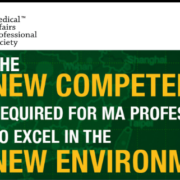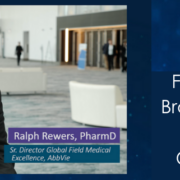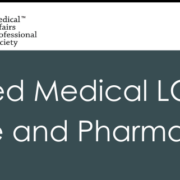Global Town Hall: An Opportunity for Medical Affairs Strategic Leadership During the Pandemic and Beyond
OVERVIEW:
The COVID-19 pandemic is affecting Medical Affairs professionals around the world, and each team is responding in different ways. During this live Global Town Hall, we will discuss how Medical Affairs can continue to function during the COVID-19 pandemic, as well as share industry best practices and consider how Medical Affairs could change post-COVID-19. Through patient-focus and peer-to-peer relationships with HCPs, Medical Affairs professionals have a unique role in ensuring the safe and effective use of medicines, vaccines and medical devices, and are also positioned to bring invaluable insights from the field into ongoing R&D. By strengthening our understanding within the pharmaceutical industry of how Medical Affairs can support HCPs and patients in these times, this Town Hall will explore how the role of Medical Affairs can be expanded to maintain quality in a rapidly evolving clinical environment, helping to achieve industry-wide alignment on the issue and potentially saving lives.
Join this webinar for insights from industry-leading experts. This series including follow-on webinars will equip MAPS members and MA professionals worldwide with the tools to fulfill the opportunity for Medical Affairs strategic leadership during the Covid-19 pandemic and beyond.
MAPS Members have access to view and download the slides from this presentation.
CLICK HERE TO VIEW AND DOWNLOAD SLIDES IN THE COMMUNITY PORTAL
SPEAKERS:
Rachele Berria
Vice President and Medical Head, US BioPharmaceuticals
AstraZeneca
Eric Mortensen
Head Gastrointestinal Clinical Development, R&D
Janssen Immunology
Tamas Koncz
Chief Medical Officer, Inflammation and Immunology
Pfizer
Isma Benattia
VP, Europe Medical Affairs
Amgen
Terry Griesing
VP, Head of North America Medical Affairs, Internal Medicine
Pfizer
Ann Hartry
VP, HEOR
Lundbeck
Audrey Krolicki
Senior Director, Head of Scientific Publications
Astellas
Danie du Plessis
Executive VP Medical Affairs
Kyowa Kirin International
AGENDA
| Time | Title | speaker |
| 9:00–9:10 EDT | The Opportunity for Medical Affairs Strategic Leadership | Chair: Tamas Koncz |
| 9:10–9:20 EDT | Evidence Generation: Ensuring Speed and Quality During Rapid Decision-Making |
Ann Hartry |
| 9:20–9:30 EDT | Evidence Dissemination: The New World of Publications and Virtual Congresses | Audrey Krolicki |
| 9:30–10:05 EDT | Audience Q&A and Panel Discussion
What has changed for Field Medical? What hasn’t changed? What are the needs now, and in the future? How can the return-to-field be balanced with continued virtual interactions? What are the key adaptive strategies, innovations and practices? |
Full Expert Panel |
| 10:05–10:15 EDT | Closing: The Opportunity for MA is Here and Now | Tamas Koncz |










